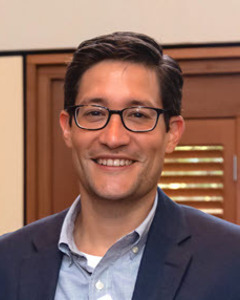Juan Del Valle

W. K. Warren Family Professor for the Warren Family Research Center for Drug Discovery and Development; Associate Chair, Chemistry & Biochemistry
University of Notre Dame
Research Interests
The Del Valle lab is broadly interested in bringing the power of organic chemistry to bear on current challenges in drug discovery and molecular recognition. Our research program lies at the interface of organic synthesis and chemical biology, with an emphasis on the structure-based design of biologically active peptidomimetics and small molecules. Current projects are described below:
Constrained peptides targeting protein-protein interactions
Despite the importance of well-defined protein-protein interactions (PPIs) in promoting various diseases, the development of molecules capable of modulating these interactions remains a significant challenge. This situation stems from a chemical biology paradox in which the need to bind large protein surfaces with precise topology is beset by the flexibility and cell-impermeability of high molecular weight inhibitors. Our lab is targeting a number of PPIs using designed protein mimics. Efforts in this area include disruption of neurodegenerative protein aggregation as well as PPIs that drive cancer.
Non-ribosomal peptide natural products
Nature remains a prolific source of drug candidates, with almost half of all FDA-approved therapeutics classified as natural product derived or inspired. Non-ribosomal peptides (NRPs) represent a particularly promising class of natural products with diverse biological activities. NRPs are predisposed to interact with protein receptors and often feature drug-like properties not typically seen in canonical polypeptides. We are pursuing the synthesis of NRPs in which unusual amino acids or unique backbone modifications are important for biological activity. We also leverage synthetic access to unusual amino acids in order to study their effects on native peptide conformation and their utility in other drug design applications.
Modulators of ER stress response
Endoplasmic reticulum (ER) stress resulting from gene amplification and aberrant protein expression is an established hallmark of cancer. As a result, many tumors hijack ER stress response mechanisms in order to evade cell death. As part of a highly collaborative effort with immunologists, cell biologists, and clinicians, our lab has developed a series of potent inhibitors of the IRE1/XBP1 signaling arm of the ER stress response. These compounds have helped to establish the clinical relevance of targeting IRE1 in a variety of disease models including chronic lymphocytic leukemia, c-Myc-driven cancers, and graft-versus-host disease. Current efforts are aimed at chemical optimization, advanced preclinical development, and elucidating the role of ER stress response in other diseases using new chemical probes.
Recent Papers
-
N-Aminoglycine and Its Derivatives Stabilize PPII Secondary Structure.
Rajewski BH, Wright MM, Gerrein TA, Del Valle JR.
Org Lett. 2023 Jun 5. doi: 10.1021/acs.orglett.3c01502. Online ahead of print.
PMID: 37276840 -
Total Synthesis of Pargamicin A.
Elbatrawi YM, Gerrein T, Anwar A, Makwana KM, Degen D, Ebright RH, Del Valle JR.
Org Lett. 2022 Dec 23;24(50):9285-9289. doi: 10.1021/acs.orglett.2c03861. Epub 2022 Dec 14.
PMID: 36516292 -
IRE-1-Targeting Caged Prodrug with Endoplasmic Reticulum Stress-Inducing and XBP-1S-Inhibiting Activities for Cancer Therapy.
Shao A, Xu Q, Kang CW, Cain CF, Lee AC, Tang CA, Del Valle JR, Hu CA.
Mol Pharm. 2022 Apr 4;19(4):1059-1067. doi: 10.1021/acs.molpharmaceut.1c00639. Epub 2022 Mar 7.
PMID: 35253431 Free PMC article.
-
Late-Stage Sidechain-to-Backbone Macrocyclization of N-Amino Peptides.
Rathman BM, Del Valle JR.
Org Lett. 2022 Feb 25;24(7):1536-1540. doi: 10.1021/acs.orglett.2c00204. Epub 2022 Feb 14.
PMID: 35157469 -
Total synthesis and chemical stability of pseudouridimycin.
Cain CF, Scott AM, Sarnowski MP, Del Valle JR.Chem Commun (Camb). 2022 Feb 15;58(14):2351-2354. doi: 10.1039/d1cc07059b.
PMID: 35080211 -
N-Amination Converts Amyloidogenic Tau Peptides into Soluble Antagonists of Cellular Seeding.
Makwana KM, Sarnowski MP, Miao J, Lin YS, Del Valle JR.
ACS Chem Neurosci. 2021 Oct 20;12(20):3928-3938. doi: 10.1021/acschemneuro.1c00528. Epub 2021 Oct 5.
PMID: 34609825 Free PMC article. - Lu, L., Zhao, M., Jin, X., Ney, G., Yang, K. B., Peng, F., Cao, J., Iwawaki, T., Del Valle, J., Chen, X., Li, Q. "Adaptive endoplasmic reticulum stress signaling via IRE1α-XBP1 preserves self-renewal of haematopoietic and pre-leukemic stem cells" 2019 Nature Cell Biology, 21, pp. 328-337. DOI: 10.1038/s41556-019-0285-6.
- Elbatrawi, Y. M., Kang, C. W., Del Valle, J. R. "Total Synthesis of L-156,373 and an oxoPiz Analogue via a Submonomer Approach" 2018 Organic Letters, 20 (9), pp. 2707-2710. DOI:10.1021/acs.orglett.8b00912.
- Xie, H., Tang, C. A., Song, J. H., Mancuso, A., Del Valle, J. R., Cao, J., Xiang, Y., Dang, C. V., Lan, R., Sanchez, D. J., Keith, B., Hu, C. A., Simon, M. C. "IRE1 α RNase-dependent lipid homeostasis promotes survival in Myc-transformed cancers" 2018 Journal of Clinical Investigation, 128 (4), pp. 1300-1316. DOI:10.1172/JCI95864.
- Sarnowski, M. P., Pedretty, K. P., Giddings, N., Woodcock, H. L., Del Valle, J. R. "Synthesis and ß-sheet propensity of constrained N-amino peptides" 2018 Bioorganic & Medicinal Chemistry, 26 (6), pp. 1162-1166. DOI:10.1016/j.bmc.2017.08.017.
- Sarnowski, M. P., Kang, C. W., Elbatrawi, Y. M., Wojtas, L., Del Valle, J. R. "Peptide N-Amination Supports ß-Sheet Conformations" 2017 Angewandte Chemie-International Edition, 56 (8), pp. 2083-2086. DOI:10.1002/anie.201609395.
- Kang, C. W., Sarnowski, M. P., Elbatrawi, Y. M., Del Valle, J. R. "Access to Enantiopure α-Hydrazino Acids for N-Amino Peptide Synthesis" 2017 Journal of Organic Chemistry, 82 (3), pp. 1833-1841. DOI:10.1021/acs.joc.6b02718.